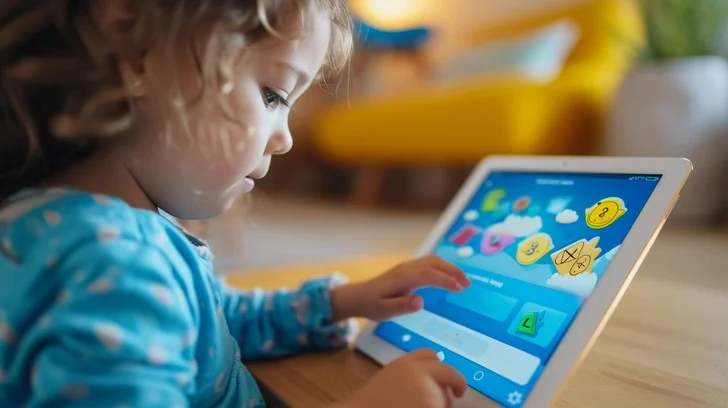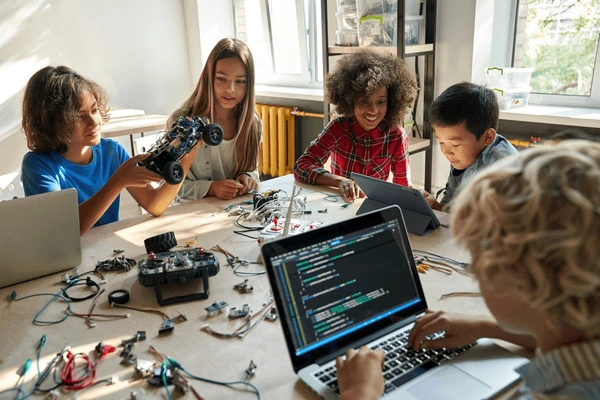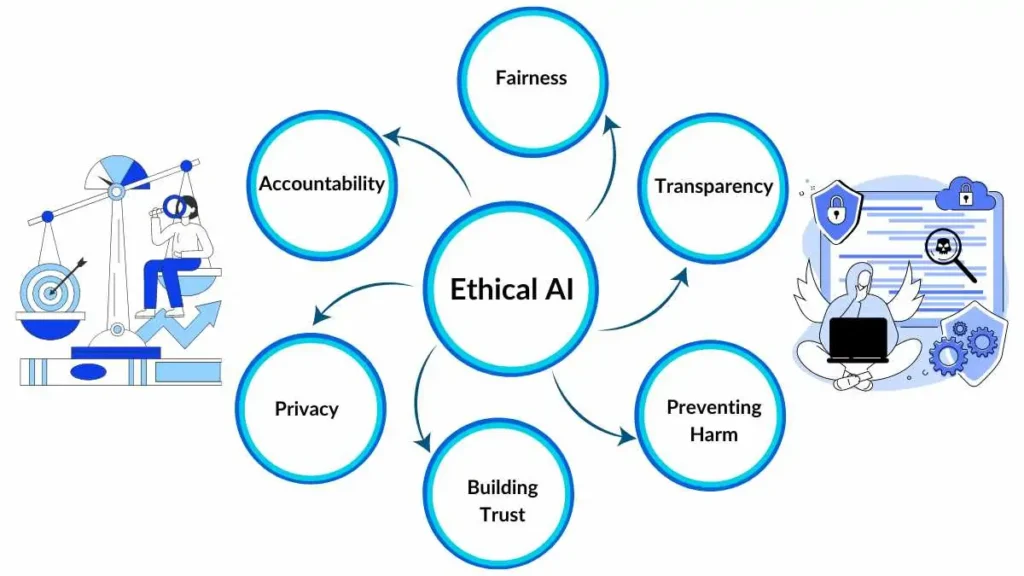Trump’s Push for AI Education in Kindergarten: Pros and Cons
Introduction
Imagine a world where kindergartners are learning about artificial intelligence (AI) just as they learn to count or spell. This might sound like something straight out of a futuristic classroom, but AI education in kindergarten could soon become a reality, especially after Trump’s push for AI education gained significant traction.
As someone who’s been researching AI for quite some time now, I’ve come to appreciate the immense potential it holds for shaping the future. But when I heard about the proposal to introduce AI education at such an early age, I couldn’t help but wonder: Is this the right time? Is it truly beneficial for kids to learn about AI before they even fully grasp basic concepts like numbers and reading?
In this article, I’ll explore what Trump’s push for AI education in kindergarten really means. We’ll dive into the pros and cons of this ambitious initiative, taking a closer look at the impact on children, teachers, and the future workforce.

Why This Matters Now
We’re living in a time when technology is evolving at a pace that’s hard to keep up with. Artificial intelligence is no longer just a buzzword in Silicon Valley, it’s becoming a central part of our daily lives. From self-driving cars to smart assistants, AI is everywhere. But as AI technology advances, the question arises: When is the right time to introduce it to the younger generation?
1. Preparing for the Future Workforce

In my research, I’ve seen numerous discussions around the future of jobs and how AI is going to play a critical role in reshaping entire industries. The argument is that by introducing AI education at an early age, children will have a head start in a world that increasingly demands technological fluency. After all, just as kids today learn to use computers, learning the basics of AI could be just as essential for future job prospects.
- AI’s Role in Everyday Life: As someone who’s been exploring the impact of AI across industries, I’ve noticed that AI technology is already integrated into many sectors, from healthcare to finance. Getting kids comfortable with AI concepts now might give them a head start in these fields.
2. The Pace of Technological Change
There’s no doubt that technology is advancing faster than ever. Take smartphones for instance, I remember when the first iPhone came out, and now we’re in an age of AI-powered assistants and autonomous machines. AI is no longer just a tool for scientists or tech geeks. It’s becoming part of our lives in ways we didn’t even imagine a decade ago.
- What’s Next for AI?: As we prepare for AI to become more integrated in everyday life, it makes sense to start educating children early so that they’re not only consumers of technology but also creators.
3. The Need for Ethical AI Education
One of the most important issues in AI development today is ethics. How do we make sure that AI systems are used responsibly? What happens when AI systems inherit biases from human programming? These are questions that children will need to understand and grapple with in the future. Teaching them early on could equip them with the skills to tackle these challenges and shape AI for the better.
Pros of Teaching AI in Kindergarten
I’m excited to see what AI education could do for younger generations, especially if it’s introduced early on. There’s a lot to be said about the positive impact this could have on children’s cognitive development and their ability to adapt to the future workforce.
1. Fostering Creativity and Problem-Solving Skills
From what I’ve researched, introducing AI education at an early age could help kids develop problem-solving and critical thinking skills that are crucial in today’s rapidly changing world.
- Early Exposure to Logic: Teaching kids the basics of AI could make them more comfortable with understanding logic, pattern recognition, and decision-making processes, skills that can be applied across multiple disciplines.
- Boosting Innovation: Kids who are exposed to AI at a young age might also start thinking about innovative solutions to problems, preparing them for the kinds of creative thinking that will be needed in tomorrow’s industries.
2. Leveling the Playing Field
One of the most exciting aspects of introducing AI education in kindergarten is its potential to level the playing field for kids from all walks of life.
- Equal Access to Knowledge: As I’ve seen from many of my research findings, access to technology can be unequal. Introducing AI education at an early age could give children, regardless of their background, the tools they need to succeed in an increasingly digital world.
3. Preparing Kids for the Digital Economy
We can’t deny that AI-driven economies are on the horizon. By teaching kids about AI early on, we’re essentially preparing them for a future where digital literacy is just as important as reading or writing.
- Future-Proofing Skills: For children in this generation, AI literacy could become as fundamental as learning to read and write. The more they learn now, the better prepared they will be to enter the workforce in a world dominated by technology.
Cons of Teaching AI in Kindergarten
While there’s a lot of potential, we also need to think about the possible downsides of pushing AI education in early childhood.
1. The Risk of Overloading Kids
Let’s be honest: kids have a lot to juggle already. Between learning math, reading, social skills, and everything in between, adding AI education might feel like too much too soon.
- Cognitive Development: Kids are still developing foundational skills. Introducing complex concepts like AI too early might overwhelm them, preventing them from mastering the basics that they need for long-term success.
2. Ethical Implications: Are We Ready?

As someone who’s followed AI for years, I often wonder about the ethics of teaching young children about a technology that is still evolving and has significant ethical questions attached to it.
- Ethical Education: It’s one thing to teach kids about how AI works, but it’s another to dive into the complexities of how AI is used in the real world, especially when it comes to privacy and bias. Are we ready to help them navigate these heavy topics at such an early age?
3. Potential for Bias in Teaching AI
AI itself can be biased, depending on how it’s trained. We need to ask: What biases are we teaching children if the AI models themselves have built-in biases? The risk here is that kids could learn AI based on limited or skewed data, which could shape their understanding of the world in the wrong way.
CONCLUSION
I’ve spent a lot of time thinking about Trump’s push for AI education in kindergarten, and while there are certainly a lot of exciting benefits, there are also important ethical questions we need to address. It’s a bold idea, one that could shape the way we teach future generations and prepare them for the challenges of the digital age. But as with any big change, it’s essential that we balance the pros with the cons and ensure we are setting kids up for success in a thoughtful, responsible way.
Are we ready to introduce AI to young learners? The future of education and technology is unfolding, and I’m excited to see where it takes us. But, as with any major innovation, we must proceed carefully and with a clear understanding of the implications.
Want More Insights Like This?
Stay ahead of the curve in AI and education technology, subscribe to TechGuidely’s newsletter for weekly updates, insights, and in-depth breakdowns of the latest trends in education and tech.
Subscribe Now and get your first tech breakdown straight to your inbox!
Suggested Articles
- The Future of AI in Education: How AI Will Shape Classrooms
A closer look at how AI is revolutionizing education, from personalized learning to AI-driven curriculum design. - Is AI the Key to Unlocking Future Skills in Students?
Dive into the role artificial intelligence can play in preparing students for future challenges, boosting creativity, and enhancing critical thinking. - Should Kids Learn Coding in Kindergarten? The Pros and Cons
An exploration of whether introducing coding at a young age will better prepare kids for future jobs, or if it’s too much too soon. - How AI Will Transform the Future of Work: Preparing the Next Generation
Learn about the impact of AI on the job market, and how children can be equipped with skills to thrive in a future shaped by automation and AI.
The Ethics of AI: Teaching Kids to Be Responsible Tech Users
A look into how we can educate children about the ethics of AI, ensuring they understand its benefits and challenges from an early age.

